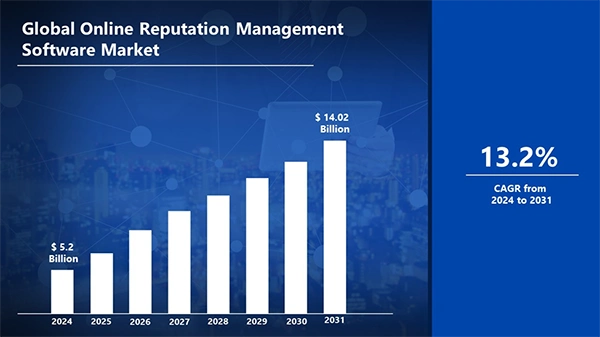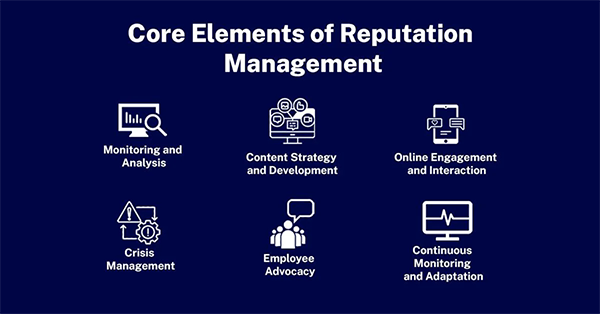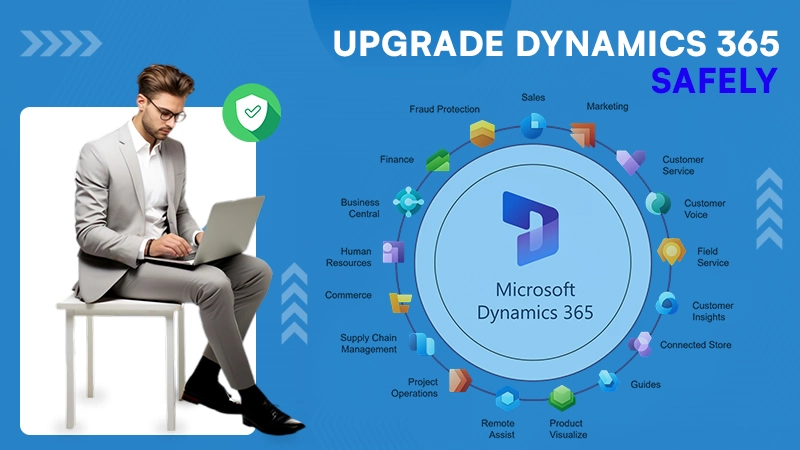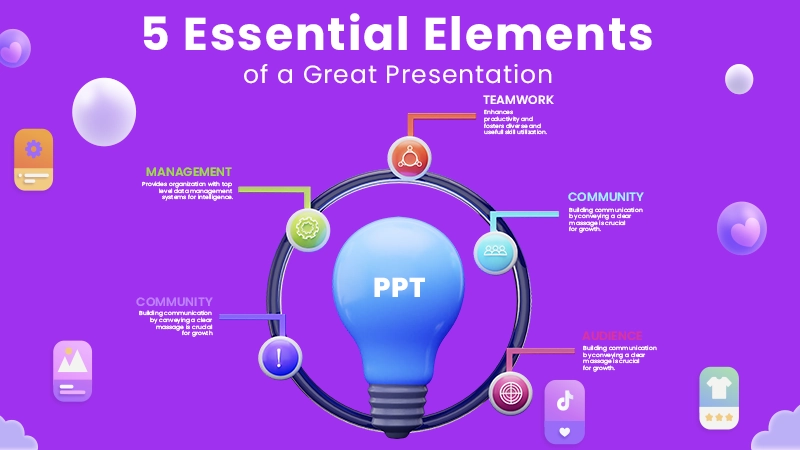In the times we live in, a strong reputation is no longer a luxury; it has become a necessity, it is the foundation on which businesses stand and grow.
A company with an excellent online reputation is capable of bringing in new clients, keeping old ones, and most primarily, growing the organization.
In this day and age of social media, and review sites, holding one’s good name does not just happen, it is required to be maintained by proactive and strategic effort.
This blog post will cover the key theme of the value of online reputation management and the key principles of creating and protecting a good presence in the online world when managing conflicts that could damage the public perception of the brand. Also, learn about Network Security Management Tools by reading this article.
What is Reputation Management?

Reputation management is all about shaping how others see your brand, which means staying aware of what’s being said, responding thoughtfully, and staying aligned with your values.
Key parts of it include:
- Monitoring Feedback: Paying attention to customer reviews, employee feedback, and social media conversations.
- Responding Thoughtfully: Addressing complaints with care and engaging with positive feedback.
- Keeping Communication Open: Have clear conversations with your audiences to build trust with honest, clear communication.
When handled well, reputation management becomes an asset, helping you build loyalty and show customers and employees they’re valued.
Why Reputation Management is Important for Business Success
Your reputation can make or break your brand, and here a positive reputation boosts trust, loyalty, and even market value.
But it also goes ahead—it shows your commitment to fair business practices.
Here’s how it makes a difference:
- Building Brand Value: A strong reputation makes your brand more valuable and brings in loyal customers.
- Gaining Trust and Loyalty: A transparent approach to customer issues promotes long-term trust.
- Staying Competitive: Customers are more likely to choose brands with a reputation for quality and care.
Think about the last time you chose a product or service based on positive reviews or recommendations; Trust built on a good stature is invaluable.

How Reputation Management Drives Growth
A good reputation isn’t only for appearances; it has real financial benefits.
Positive reviews and loyal customers mean more repeat business and referrals.
Strong brands with good reputations often see higher sales, market value, and customer loyalty.
Here’s how it supports growth:
- Customer Loyalty: Happy customers come back and often refer others.
- Increased Sales: Research shows brands with strong reputations can see up to 25% higher sales.
- Valuable Feedback: Customer insights help you improve products and services.
For instance, a well-known restaurant chain saw a rise in returning customers after actively responding to feedback and making changes that customers valued.
Maintaining Corporate Integrity
Integrity is at the core of a good reputation when a business acts transparently and ethically, it respects customers, employees, and the wider community.
This focus on integrity boosts employee morale and improves public perception. Here’s how brands can stay true to their values:
- Setting Clear Conduct Standards: Define expectations for behavior that align with company values.
- Regular Training: Reinforce ethical practices with regular training.
- Encouraging Honest Feedback: Create a space for employees to share concerns and feel respected.
When companies implement these practices, they build a culture that resonates with employees and customers.
Core Elements of Reputation Management
Effective reputation management relies on a few key elements including monitoring reviews, using social media to connect with customers, addressing complaints, and building relationships.
Here’s how each part works together:
- Review Monitoring: This shows customers that you’re paying attention and care about their experience.
- Social Media Engagement: Builds a connection with your audience.
- Complaint Resolution: Shows a real commitment to customer care.
- Stakeholder Relationships: Builds trust with all those invested in your brand’s success.
Together, these efforts help you build a strong, positive public image.

Managing Online Reviews
Online reviews are vital, and they are not just feedback but insights into what’s working and where you need to improve.
Responding to reviews shows that you’re listening.
- Respond Quickly: Show customers that their feedback matters by promptly addressing reviews.
- Handle Negativity with Care: Address concerns and offer solutions to build trust.
- Encourage Positive Feedback: Invite satisfied customers to share their experiences.
Using Social Media for Brand Building
Social media isn’t just for promotion; it’s also where you build and protect your reputation.
With regular engagement, brands can connect with their audience, share customer stories, and address feedback directly.
- Stay Responsive: Answer questions and address concerns to show you’re listening.
- Share Quality Content: Post helpful, informative content that reflects your brand.
- Practice Social Listening: Track mentions and trends to understand customer views.
Social media engagement builds strong connections with your audience and helps improve your public image.
Addressing Customer Complaints
Customer complaints are a chance to show that you care and handle issues promptly that have turned a frustrated customer into a loyal one.
- Quick Responses: Prevent escalation by addressing complaints promptly.
- Clear Communication: Be open and honest to build trust.
- Empowered Staff: Train employees to handle complaints with care and efficiency.
After creating a dedicated complaint resolution team, a national retailer saw higher customer retention, leading to stronger relationships and brand loyalty.
Building Positive Relationships with Stakeholders
Good reputation management includes creating trust with all stakeholders and that simply means communicating regularly and staying aligned with their expectations.
- Frequent Updates: Keep stakeholders informed through newsletters, social media, and regular meetings.
- Personalized Communication: Show appreciation with targeted messages.
- Involve Stakeholders in Decisions: Make stakeholders feel valued and part of the process.
By being open and engaged, brands create advocates who promote and support the brand’s goals.
Challenges in Reputation Management
Reputation management has challenges, like dealing with negative publicity, handling crises, and countering false information.
If not managed well, these issues can damage trust, here’s how to address them:
- Negative Publicity: Being open and transparent will surely assist you in regaining trust.
- Crisis Management: Also, in order to protect your image, begin to respond quickly and clearly.
- Handling False Information: Post regular, accurate updates to correct misinformation.
When an airline faced backlash over an incident, its prompt response and commitment to improving practices helped regain customer trust.
Do You Know?
85% of consumers trust online reviews as much as personal recommendations.
Consistency and Transparency in Messaging
Customers want brands to keep their promises and be clear about their practices, thus, consistency in messaging builds trust.
Here’s how to stay consistent:
- Frequent Reviews: Check that your communications reflect your values.
- Ask for Feedback: Regularly ask customers and employees for their views on your messaging.
- Train Staff: Also, must ensure everyone understands and supports the brand’s values.
A clear and consistent brand message keeps customers loyal and reinforces trust.
Strengthening Your Reputation Management Strategy
Effective reputation management requires regular review, proactive steps, and investment in training.
Brands that keep up with feedback build lasting trust and can adapt to market changes.
- Conduct Reputation Audits: Regularly assess feedback to stay aware of how your brand is seen.
- Protect Your Brand: Monitor online mentions and respond to issues quickly.
- Train Employees: Make sure your team knows how to reflect your values.
Leading brands know that investing in their reputation is vital for long-term success.
Getting Professional Help for Reputation Management
Professional reputation management services offer valuable tools and guidance.
They support monitoring feedback, managing crises, and improving online presence.
For businesses without in-house resources, outsourcing to a reliable service ensures their reputation is in capable hands.
- Data-Driven Strategies: You can use trends and insights to respond effectively.
- Industry Knowledge: Benefit yourself from expertise tailored to your market.
- Free Up Resources: Encourage your team to focus on growth when experts manage reputation.
A strong reputation opens doors for growth and supports success. With the right approach, your brand can thrive in any environment.
Thus, always bear in mind that Corporate reputation management is a vital step in achieving these outcomes.










